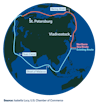Published
November 14, 2024
Russia and the northern members of U.S.-led NATO are maneuvering amid the receding ice packs for strategic advantage. Now China is leveraging its growing ties to Russia to advance its interests. Among the expected rewards are the region’s abundant resources of fish, minerals and energy, and quick maritime passage from one ocean to another.
The COP29 climate conference this week in Baku will devote an entire “Arctic Pavilion” to the environmental impact of warming: rising sea levels, loss of habitat for wildlife, and methane emissions of the thawing permafrost. However, emerging commercial and strategic opportunities will also make the Arctic a geopolitical theme for years to come.
This topic was recently explored on The Call, a morning video update offered by the Chamber’s Global Intelligence Desk.
Once freezing and impassable, the thawing Arctic will soon present new shipping routes that can halve the time and distance to ship from Asia to Europe. The most promising is the Northern Sea Route that hugs Russia’s coast. But Moscow’s war effort in Ukraine—and the resulting Western sanctions—have hampered its ability to develop its northern ports.

Enter China. For years a second-tier player for Arctic influence, Beijing has become Moscow’s close partner in the north, joining forces in projects including satellite navigation, exploration, rail linkages, port enhancement and joint patrols. China is reportedly building docks on all five of Russia’s major ports on the Arctic Ocean.
“Moscow has looked to Beijing to develop the Northern Sea Route, invest in its Arctic energy projects and infrastructure, and enhance military cooperation,” said a report by the German Marshall Fund. “In return, Moscow has become Beijing’s conduit for greater activity in the Arctic.”
The growing Russia-China partnership poses significant challenges to the other nations of the region, all seven of which are NATO members—the U.S., Canada, Norway, Iceland, Sweden, Denmark, and Finland.
The U.S. has noticed the growing China-Russia ties and the implications for China's ability to project power. “While significant areas of disagreement between (China) and Russia remain,” said the Pentagon in a June report, “their growing alignment in the region is of concern.”
Heather Conley, the German Marshall Fund’s former president and current senior advisor and a long-time member of the U.S. diplomatic corps, joined The Call (part of the Chamber's Global Intelligence Desk) recently. Conley is the lead author of a series of reports on the growing cooperation between Russia and China in the Arctic.
Stay Informed with The Call
The Call is a morning video update offered as part of the U.S. Chamber's Global Intelligence Desk. It is available only to Chamber members. For more information, please email: globalintel@uschamber.com.
About the author

Jay Sapsford
Jay Sapsford is Senior Vice President for Global Risk Analysis and helps lead the Chamber’s efforts in assessing geopolitical and economic risks that impact the business community. He plays a key role in identifying global trends, risks, and opportunities on behalf of the Chamber’s membership.





